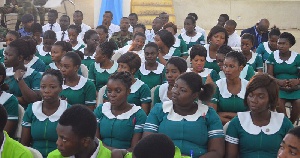Ghana has exceeded the World Health Organization’s (WHO) recommended nurse to population ratio of 1nurse to 1,000 population, the Minister of Health, Mr Kwaku Agyemang-Manu has said.
According to him, Ghana’s doctor/population and nurse/population ratios have shown significant improvements, indicating that the sector's efforts at bridging the equity gap that has existed for decades are beginning to yield some results.
“Our doctor/population and nurse/population ratios have shown significant improvements. Using only nurses from the public sector, Ghana has exceeded the WHO's recommended nurse to population ratio of 1nurse to 1,000 population. Ours today, is 1 nurse to 839 of our population, which is lower than the WHO recommended ratio,” he said.
Mr Agyemang-Manu was speaking at the 2019 Health Summit, which was held in Accra on Monday.
Dubbed, “Ghana’s Movement Towards Universal Health Coverage”, the summit was to review the performance of the health sector in the implementation of the 2018 Programme of Work to inform policy, moving forward.
Mr Agyemang-Manu also stated that the health sector has been able to maintain its performance in childhood immunization, adding that coverage in postnatal services was beginning to show an upward trend.
“Results from the survey and institutional sources shows significant improvement in Maternal and Child indicators,” he said.
However, he identified that although the sector was yielding some positive results, the sector did not meet its expectations in some areas. “Targets for a number of our service indicators were not met. The number of mothers who exclusively breastfed their babies is on a decline. Hospital bed occupancy is low and average length of stay in emergency wards is unacceptably high,” he said.
“Antibiotic prescription at our facilities are relatively high whilst NHIA reimbursement of providers for services rendered is taking longer than expected,” he added.
Meanwhile, Mr Agyemang-Manu said the level of Persons Living with HIV (PLHIV) who received Antiretroviral Therapy was below expectation, whilst Tuberculosis case detection rate was low. “We also recognise that we need to do more with new born care,” he said.
He attributed the mixed performance in the sector to a number of challenges, for which he said a multi-stakeholder approach and strong leadership at all levels are essential.
“Government alone has neither the resources nor skills to undertake all the health initiatives required for us to make the rapid improvement in health service outcome we all yearn for. We will need to work with leaders from business, academia, NGOs and the media in the same way we work with our Development Partners," he said.
"We also recognise that we need to improve upon our data capture and validation processes. We are working on it and pretty soon we shall start seeing some progress,” Mr Agyemang-Manu added.
Health News of Monday, 15 April 2019
Source: atinkaonline.com

















